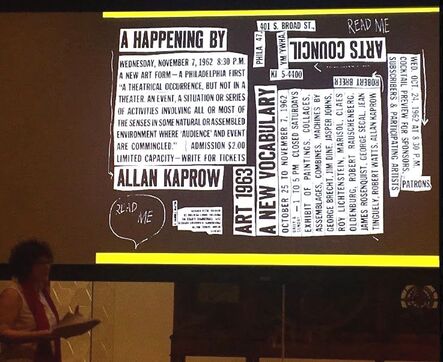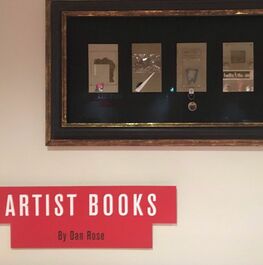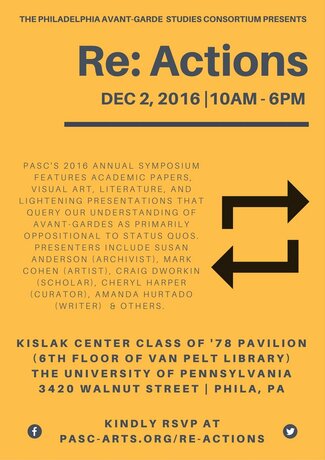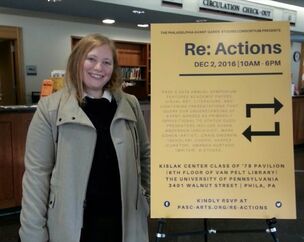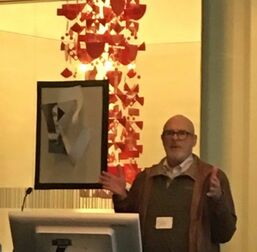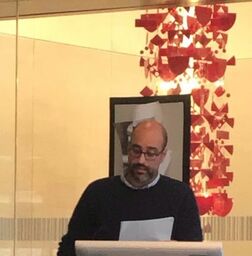PASC 2016 Symposium
Re: Actions
The Oppositional Births of Avant-Gardes
Friday, Dec. 2, 2016
Program
9:30 a.m.
Coffee
10 a.m.
Welcome (David McKnight)
10:15 a.m.
Papers (Katie Price, Session Chair)
Susie Anderson, “From the PMA Archives”
David McKnight, “Published in Paris / For Sale in New York: The Gotham Book Mart Archive"
Hammam Aldouri, “Towards an Understanding of the Unassisted Ready-Made as Artistic Practice"
John Heon, “Rire-Garde: Duchamp, Nauman, and the Humor of the New”
12 noon
Lunch (on your own)
1:30 p.m.
Lightning Presentations & Interactive Art (David McKnight, Session Chair)
Randall Couch, Peal
Dan Rose, About Face
Amanda Hurtado, S ACE P
Emily Brewton Schilling, “all those words”
2:30 p.m.
On Supplement: A Moderated Discussion (Katie Price, Moderator)
Orchid Tierney, Ariel Resnikoff, and Julia Warner (via Skype)
3 p.m.
Coffee
3:30 p.m.
Papers (John Heon, Session Chair)
John Szwed, “The Antiquity of the Avant-Garde: A Meditation on a Remark by Duke Ellington”
Cheryl Harper, “Avant-Garde Activities at the Gershman Y in the '60s”
Craig Dworkin, “Trolling Conceptualism”
5:15 p.m.
Conclusion & Special Announcement (John Heon)
5:30 p.m.
Reception on Moelis Terrace
Coffee
10 a.m.
Welcome (David McKnight)
10:15 a.m.
Papers (Katie Price, Session Chair)
Susie Anderson, “From the PMA Archives”
David McKnight, “Published in Paris / For Sale in New York: The Gotham Book Mart Archive"
Hammam Aldouri, “Towards an Understanding of the Unassisted Ready-Made as Artistic Practice"
John Heon, “Rire-Garde: Duchamp, Nauman, and the Humor of the New”
12 noon
Lunch (on your own)
1:30 p.m.
Lightning Presentations & Interactive Art (David McKnight, Session Chair)
Randall Couch, Peal
Dan Rose, About Face
Amanda Hurtado, S ACE P
Emily Brewton Schilling, “all those words”
2:30 p.m.
On Supplement: A Moderated Discussion (Katie Price, Moderator)
Orchid Tierney, Ariel Resnikoff, and Julia Warner (via Skype)
3 p.m.
Coffee
3:30 p.m.
Papers (John Heon, Session Chair)
John Szwed, “The Antiquity of the Avant-Garde: A Meditation on a Remark by Duke Ellington”
Cheryl Harper, “Avant-Garde Activities at the Gershman Y in the '60s”
Craig Dworkin, “Trolling Conceptualism”
5:15 p.m.
Conclusion & Special Announcement (John Heon)
5:30 p.m.
Reception on Moelis Terrace
Inspiration for the RE: Actions topic
Avant-gardes are often born from reactions against the restrictions and authority of a status quo. They form their identities by opposing a tradition, a canon, an artistic or societal establishment and, in doing so, they challenge the conventions that define what art can be, how and where it can be made, and who is allowed to make it. From the Impressionists’ rejection of academic painting, to Rimbaud’s call to “épater la bourgeoisie,” Schoenberg’s shunning of tonality, Duchamp’s dismissal of “retinal art,” Stein’s attack on syntax and linear plot, Dada’s defiance of logic and sanity, the Harlem Renaissance’s eschewing of formal poetics for a colloquial blues/jazz aesthetic, the Beats’ transgression of sexual taboos, Cindy Sherman’s parody of traditional portraiture, and Ai Weiwei’s subversive taunting of the Chinese government, flouting norms and mocking authority have been central to the births of avant-garde movements and the development of individual avant-garde artists.
Although this “self-definition by opposition” is often marked by an attempted destruction of past standards, simply being iconoclastic or shocking the bourgeoisie is not enough. After smashing the gods of the past, after hurling “merdre” at a complacent establishment, an avant-garde must offer a genuinely new vision, some positive creation in place of that which it has destroyed or denied, or else it will ultimately prove to be shallow and short-lived. This is where another sense of the word “reaction” comes into play: the “aesthetico-chemical reactions” that take place to form the new, something that was suggested by Picabia’s jocular reconfiguring of the periodic table in “Construction Moléculaire” (1919).
In our presentations, we considered some of the following questions: What was this avant-garde reacting against; what restrictions, norms, or conventions did it oppose, and why? What gaps, lacks, or absences did this avant-garde see? What did it try to create in place of that which it rejected or attacked? How did it “make it new” in terms of aesthetics, politics, psychology, sexuality, race, or ethnicity—or a combination of these elements? Is the rejection/reaction paradigm overemphasized in the evaluation of this avant-garde? Was there a more complex mixture of rejection and acceptance of the past, a casting off of some elements but a creative reuse or remixing of others?
Because 2016 marked 100 years since the “oppositional birth” of Dadaism, the symposium concluded with a devoutly disrespectful “Anti-Birthday Party."
Although this “self-definition by opposition” is often marked by an attempted destruction of past standards, simply being iconoclastic or shocking the bourgeoisie is not enough. After smashing the gods of the past, after hurling “merdre” at a complacent establishment, an avant-garde must offer a genuinely new vision, some positive creation in place of that which it has destroyed or denied, or else it will ultimately prove to be shallow and short-lived. This is where another sense of the word “reaction” comes into play: the “aesthetico-chemical reactions” that take place to form the new, something that was suggested by Picabia’s jocular reconfiguring of the periodic table in “Construction Moléculaire” (1919).
In our presentations, we considered some of the following questions: What was this avant-garde reacting against; what restrictions, norms, or conventions did it oppose, and why? What gaps, lacks, or absences did this avant-garde see? What did it try to create in place of that which it rejected or attacked? How did it “make it new” in terms of aesthetics, politics, psychology, sexuality, race, or ethnicity—or a combination of these elements? Is the rejection/reaction paradigm overemphasized in the evaluation of this avant-garde? Was there a more complex mixture of rejection and acceptance of the past, a casting off of some elements but a creative reuse or remixing of others?
Because 2016 marked 100 years since the “oppositional birth” of Dadaism, the symposium concluded with a devoutly disrespectful “Anti-Birthday Party."


